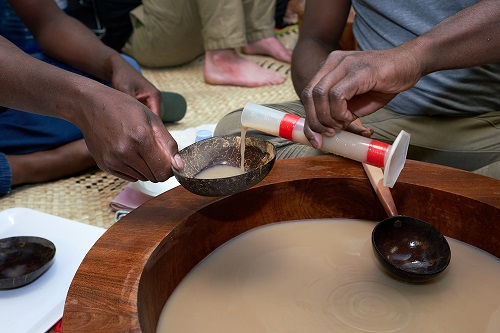
E mālama i ka wai.
Take care of the water — Kanaka 'Ōiwi or native Hawaiian proverb
The taro plant is a food staple for indigenous peoples across Moananuiākea. It is closely linked to cultural concepts of land, family, genealogy and well-being.
Taro is best grown under certain conditions, including the right flow of water. Thriving taro patches rely on the community coming together and often getting up to their knees or thighs in the water.
The Lo'i Pacific Research and Innovation Hub is a place where diverse stakeholders can come together in a spirit of indigenous innovation to achieve meaningful impact and to deliver outcomes that matter to Pacific communities, organisations and various stakeholders.
Like a Pacific wetland taro patch, the Hub is a place for growing a thriving ecosystem of Pacific research, researchers and research excellence. It is a place where diverse voices in research can come together to innovate.
- Give effect to the Objectives of the Pacific Strategic Plan 2021-2024, including Objective 7 "Grow Pacific researchers and research excellence".
- Create a thriving and innovative Pacific research ecosystem.
- Engage in "push research" which connects with "pull" innovation through "academic rigor", "social impact" and academic and socio-economic value. Terms adapted slighty from those used by Josemaria Siota (2020) Technology Transfer: Commercializing Discoveries at Research Centers Through Linked Innovation.
- Build collaborative research communities of diverse stakeholders with heterogenous knowledge.
- Increase trust in research and research methods amongst low-trust Pacific communities.
- Produce knowledge and solutions which benefit Pacific end-users and enhance the University's research capacity and strength.
- A research hub aimed at linked innovation — that is, research as discovery, transformation as invention, and innovative, positive socio-economic impact. Siota, ibid.
- A digital and physical space for diverse stakeholders to come together to create and disseminate knowledge and innovate solutions.
- Pacific values including aloha, teu le va, talanoa, ako, humility (see Pacific Strategic Plan 2021-2025).
- Diversity and equity.
- Academic rigor.
- Research excellence.
- Collective and social impact.
- Innovative solutions.
Pacific research at Waikato

Ma ka hane ka ike
In the work is the knowledge — native Hawaiian 'ōlelo no'eau or proverb
Across Moananuiākea or the Pacific Ocean, anciently and in many places today, communities have lived ecosystems where resources are managed so that benefits are shared, communities use disruption and uncertainty to create dynamic responses and innovation, and the goal is abundance for all.
For communities to thrive, water must flow right through the ecosystems from ma'uka to makai — or from ridge to the shore and reef. It must flow from the tall trees of the forests to the taro patches where everyone works together to the sea of possibilities beyond. And knowledge is created together and shared.
At the University of Waikato, we have a thriving research ecosystem that nurtures Pacific research, researchers and research excellence.
Pacific research degrees
We are committed to growing Pacific researchers and graduate students at Waikato study with researchers who are experts and leaders in their fields.
Join a vibrant community of researchers studying what matters to Pacific people and communities at a research-intensive university by undertaking a research degree.
Explore your options at the School of Graduate Research.

Kava based therapy for psychological trauma
Pacific health researcher Dr Apo Aporosa has been awarded a Health Research Council grant to co-lead a team evaluating the efficacy of traditionally influenced kava use spaces as a therapeutic environment for reducing PTSD symptoms.